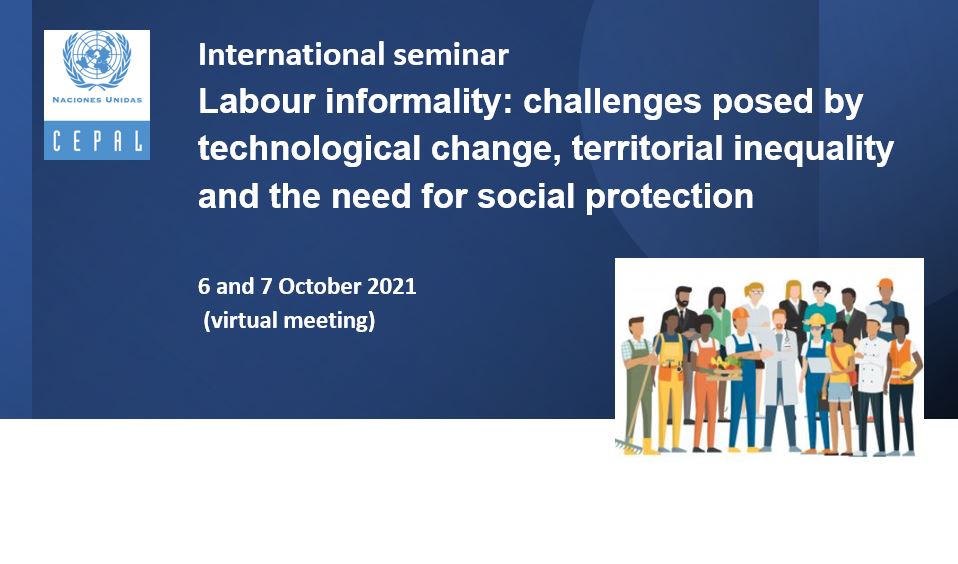The COVID-19 crisis has reaffirmed the importance of harnessing technological advances and exposing territorial inequalities to promote decent jobs in Latin America, underlined specialists at an event on informal labor
Work area(s)
An international seminar organized by ECLAC on October 6-7 announced the key findings of a project financed by the United Nations Development Account.

The COVID-19 crisis has reaffirmed the need to promote productive, decent jobs in Latin America, which includes the implementation of multisectoral policies to confront the high rates of informal labor that characterize the region, underlined government representatives and specialists in the international seminar on Labour Informality: Challenges posed by technological change, territorial inequality and the need for social protection, organized on October 6-7, 2021 by the Economic Commission for Latin America and the Caribbean (ECLAC).
The event presented the key findings of the project Transforming technology in Latin America: Promoting productive jobs and confronting the challenge of new forms of informal employment, financed by the United Nations Development Account and carried out since 2018 by ECLAC’s Economic and Social Development Divisions and its Buenos Aires Office.
“The project arose from the need to develop policies to address the high rates of labor informality in the region, a phenomenon that poses an obstacle to the labor and social rights of workers, and in light of the imperative need to ensure that technological advances do not deepen existing inequalities instead of being a tool for promoting increased productivity and development in our countries,” explained Daniel Titelman, Director of ECLAC’s Economic Development Division.
During 2020, and in the middle of this project, the crisis caused by the COVID-19 pandemic sharpened pivotal, structural problems in the region, including low investment and productivity, high unemployment and inequality, and of course, informality, said Titelman. This put the spotlight on the pertinence of this project and the need to continue designing alternative ways to promote decent jobs, he asserted.
Likewise, the Direct of ECLAC’s Social Development Division, Alberto Arenas de Mesa, remarked that “labor informality is a structural phenomenon in the countries of Latin America and the Caribbean.” According the International Labour Organization (ILO), 53.1% of workers in the region were working informally in 2016. The impacts of the pandemic likewise laid bare the enormous vulnerability of these workers in the face of different crises; therefore, it is essential that there be universal, comprehensive and sustainable social protection systems. “Labor informality is cross-cut by the structural axes of social inequality in the region, including gender, ethnicity, race, age and territory, in addition to socioeconomic inequalities,” he warned.
Both officials agreed that the post-pandemic reactivation of the labor market in LAC will be slow and it will take a long time for the main indicators in the world of jobs to return to pre-pandemic levels.
Finally, Arenas de Mesa noted that “the sub-national governments are on the front lines of the response to the COVID-19 pandemic. They will be the ones – regional and local authorities – in charge of applying critical containment measures in the short term and implementing the recovery measures in the long term, from health care and social assistance to economic development and public investment.”
Martín Abeles, Director of ECLAC’s Buenos Aires Office, made a presentation in the second half of the seminar on the relationship between old and new forms of informal labor and social protection as well as the territorial dimension of the problem. Unlike other crises that the region has gone through, during the pandemic informal labor has not been a factor of “refuge” for people in situations of vulnerability, but rather just the opposite: they have been the most deeply affected, and governments have deployed policies and instruments to contain the situation, explained Abeles.
In March 2021, 34 monetary transfers were identified, especially aimed at vulnerable informal workers in the region, as pointed out in the seminar, with persistent gaps in social protection for these workers and demonstrating the need to advance toward early identification of the diverse manifestations of inequality, including the territorial dimension.
Making progress toward Sustainable Development Goal (SDG) 8 on Growth and Decent Jobs involves extending social and labor rights to all workers, regardless of their contractual situation. This poses the challenge of confronting the legal vacuum that affects many emerging occupations, such as those related to platform work, a point raised during the seminar.
Reflecting on informality, the factors associated with its origins and persistence, its measurement at the territorial level and its impact on the reproduction of inequality and access to social protection has become more of a priority than ever, concluded the specialists during the event.
The seminar’s objective was to promote regional and inter-regional dialogue based on the main findings of the project implemented in seven Latin American countries (Argentina, Chile, Colombia, Ecuador, Peru, Mexico and Uruguay), identifying policy recommendations and the key benchmarks for applying them.
Related content

International seminar "Labour informality: challenges posed by technological change, territorial inequality and the need for social protection"
This virtual seminar aims to promote regional and interregional dialogue, based on the main findings of the project “Technological transformations in Latin America: promoting productive jobs and…
Subregional headquarter(s) and office(s)
National Office, ArgentinaType
Country(ies)
- Latin America and the Caribbean
Related project(s)
Contact
Public Information Unit
- prensa@cepal.org
- (56 2) 2210 2040
